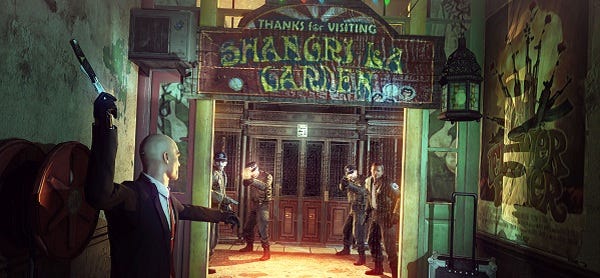Much Obliged: Hitman's Freeform Contracts
The Hit Machine
I’ve doubted, I’ve cursed and I’ve hoped. That it’s taken this long for Hitman’s new subtitle to reveal the glory of an older subtitle has given me good reason for the clip full of cynicism I’ve often been tempted to level at its gleaming tessellated cranium. But witnessing today’s announcement of the Contracts feature has filled me with a sort of giddy glee. It’s a creative murder-mode that seems to capture everything I’ve ever loved about the series.
Here’s how it works. In Contracts mode you can pick an area of the game (presumably one that you’ve already completed in the story) and can then make your way through, still as 47 but with no objective. IO are calling the style “play to create” because although it is, in some senses, a mission designer, there are no separate tools involved, just separate actions.
47 is the level design tool. He chooses the objectives, he chooses the optimal way for those objectives to be met, and he does that by performing hits. On anyone. Kill any person in the game, however you think it best or worst for them to meet their end, and get away with it afterwards and you have created a contract that is then uploaded to a server for other players to attempt.
This was demonstrated on the two earliest parts of the game ever shown publicly: the dimly lit, stormy Chicago library escape and a section of the same mission that takes place in an apartment full of bright lights, hippies and plants of dubious legality. So that library, with its feel of “not being an assassin but rather a cop killing escapee” is now a playground for Hitman to do what he was designed to do, just as the earlier games always were at their best. You enter, you mark up to three targets, you kill them and you escape through one of multiple exits.
The game tracks the weapons that the marks are killed with, the order in which they die, any non-contracted casualties, whether a change of disguise is used, whether 47 is spotted and which exit he leaves by.
So let’s say I want to create the most fiendishly difficult contract imaginable. I scout out the level, I look for people who are rarely isolated from their allies, who don’t wander into dark corners, who are cautious and well-armed. And then I decide that they have to be killed with a knife, up close and personal. Nobody else can die, so no shootout to reach the exit…and that exit is going to be at the farthest possible point of the area from the location that the final target normally calls home. Oh, and I’ll do the whole
thing with my barcodey baldness on display. No cop uniform, no way of hiding in plain sight.
To set all those parameters, I’d have to play through the level and execute the contract myself, without breaking the rules. If I have to duck out of another exit, that’ll be the necessary exit for anyone else playing; if a guard trips and falls onto a hail of bullets that just so happen to be spraying from my firearm, collateral damage is acceptable for whoever plays next as well.
There are rules, then, but they are rules that can be broken. One purpose of sharing the contract is to allow other people to try and outdo the originator and IO showed that in two brilliantly varied playthroughs of the same hit.
The first time through, the contract was created. This, to make it absolutely clear, simply involves playing the game and doing as one pleases. In this instance, it involved sneaking through a veritable indoor jungle of weed, finding one isolated dealer and stabbing him and then disaptching an isolated cop in a nearby room. Once done, escape was made by the building’s main elevator, which just so happens to be guarded by four cops. 47 slid along to another room on his aching haunches, switched on some disco music to draw the guards from the elevator, and he was done. Never spotted, never threatened. The hit was complete.
Playthrough number two introduced the scoring system. Completing contracts rewards the player with a paycheck, with deductions for each deviation from the rules laid out. The money earned can be spent on weapons and disguises. Any weapon in the game, any costume in the game, all are available to unlock for use in Contracts mode. Pleasingly, it’s possible to begin a hit wearing a chicken suit. Hitman’s taste for the playfully surreal is intact.
The second player in this instance chose to begin dressed as a cop and this immediately changes the possible paths through the apartments. Since there is a police raid happening as the contract begins, the bleary-eyed tenants will run away without causing the cops to react because, after all, they were already running away and panicking. As for the police, they won’t notice Hitman’s barcode unless he stands too close to them for too long, so it’s much easier to navigate this time. No crawling through the leaves and stalks.
A throwing knife dispatches the first mark and then it’s on to the cop. He’s a dirty cop this one I reckon, I think they mostly are, and he’s trying to find his way into a safe that he’s found in a back room of the apartment. Eventually he becomes frustrated and walks away. Learning the habits, paths and behaviours of each individual should be extremely important, and this is one example of where it pays off wonderfully.
Find the code – scrawled on a piece of paper nearby – and it’s possible to open the safe. Inside, along with the expected piles of a different sort of greenery, are some plastic explosives. Don’t question why because Hitman has now become what it always was in my memory, a kind of Looney Tunes hyperviolence with odd yet logically predictable chain reactions, more silly than sinister.
Prime the explosives and retreat to the shadows. Wile E Copote eventually makes his way back to the safe and – whaddyaknow – he’s excited to see that it’s open. He calls in his friends, the ones who were guarding the elevator. He must die, that’s one of the rules laid out in the contract, but there was no collateral damage in the original passage of play. This time there is. The trigger is hit, the explosion finishes the job that curiosity started, and 47 has a clean route to the exit.
It’s the piano falling on the head, the rake flipping up into the face. It’s farcical, it’s creative and it’s just one possible ending of one possible scenario.
Because of the unwanted casualties, the score is lower, the payoff is less and even though faster, which earned extra points, the hit isn’t considered as successful as the first. There is that competitive edge, and there will be leaderboards and highlighted user-created contracts every week, but even if you don’t care for competition at all, the Contracts mode should still be an extraordinary assassination sandbox, encouraging exploration, engagement, and the creation of ludicrously violent punchlines rather than believable brutality.
Before introducing the mode, IO said that it had been inspired by watching people play the previous games and realising that they didn’t just want to perform the hits they’d been given effectively, they wanted to explore, to find new targets of their own. Maybe there’s a character who has dialogue that rubs you up the wrong way, treating everyone around him like crap. Make him a target. Maybe you just want to see if it’s actually possible to perform that one ludicrous environmental kill that has always looked so tempting and nonchalantly stroll away afterwards.
It’s those self-imposed challenges and emergent experiences that were so much a part of my favourite times with Hitman in the past and to see a mode built seemingly entirely for me is quite flattering. That it seems to have a decent method of dishing out unlocks through online integration and creative competition is a bonus rather than the meat of the mode, I’d argue. The meat is the murders and all the strangeness that they offer.
It’ll take strong level design to make this mode as good as it could be, but that said, I wasn’t at all convinced by the library level when I first saw it because it seemed like a linear pursuit and not at all what I expected from a Hitman game. People said, quite rightly, that it was probably just a bad level to demonstrate the possibilities of the game with. In Contracts mode, it’s become a bloody good level to demonstrate those possibilities with and that’s enough to make me forget (if not forgive) that trailer, for now at least, and only makes me want to see what else is up those exquisitely tailored sleeves.




















